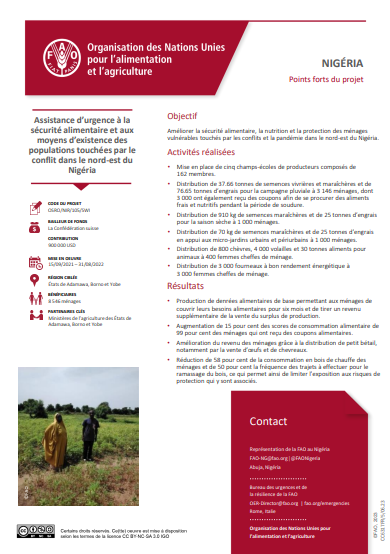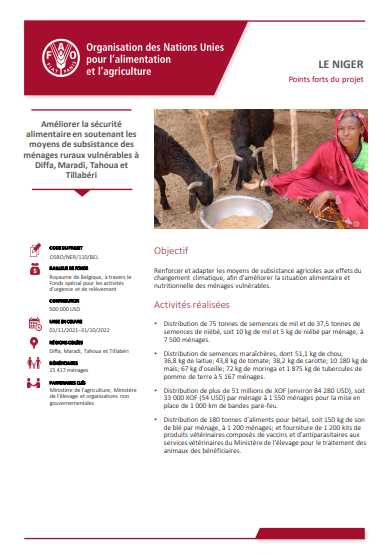Publications

Consolidation de la paix au Sahel et en Afrique de l'Ouest
07/2023
Enseignements et bonnes pratiques liés aux projets du Fonds pour la consolidation de la paix exécutés par la FAO

Mauritanie et Sénégal: Points forts du projet - OSRO/INT/102/BEL
07/2023
Le Royaume de Belgique, à travers le Fonds spécial pour les activités d’urgence et de relèvement - Fenê,tre d'action d'anticipation, a financé le projet "Actions intégrées d’anticipation, de prévention et de contrôle contre la pullulation des ravageurs dans les périmètres agricoles en Mauritanie et au Sénégal" pour un montant de 300 000 USD.

West Africa and the Sahel: Germany’s contribution through the Special Fund for Emergency and Rehabilitation Activities (SFERA) – Anticipatory Action window
07/2023
In Central America’s Dry Corridor, long periods of drought interspersed with heavy rains threaten the food security of vulnerable populations.

Dry Corridor: Canada’s contribution through the Special Fund for Emergency and Rehabilitation Activities (SFERA) – Anticipatory Action window
07/2023
In Central America’s Dry Corridor, long periods of drought interspersed with heavy rains threaten the food security of vulnerable populations.

Burkina Faso: Project Highlights - OSRO/BKF/801/SWE
07/2023
Réponse d’urgence et appui à l’amélioration de la résilience des populations vulnérables dans les zones à risque du Burkina Faso

The Bolivarian Republic of Venezuela: Humanitarian Response Plan 2022-2023
07/2023
In the Bolivarian Republic of Venezuela, the socioeconomic crisis continues to drive food insecurity – the most pressing challenge for the population.

Afghanistan: Humanitarian Response Plan 2023
06/2023
Climatic, political and economic shocks continue in Afghanistan, where two out of every five people face high levels of acute food insecurity.

Bangladesh: Rohingya Humanitarian Crisis Joint Response Plan 2023
06/2023
Nearly 1 million Rohingya refugees live in Cox’s Bazar, the world’s largest refugee camp, and are entirely dependent on humanitarian assistance.

The Sudan: DIEM – Data in Emergencies situation overview
06/2023
In collaboration with the FAO Representation in the Sudan, the FAO Subregional Office for Eastern Africa, the FAO Regional Office for Near East and North Africa, and the FAO Inclusive Rural Transformation and Gender Equality Division, this DIEM – Data in Emergencies situation overview presents the potential impacts of the ongoing conflict on agriculture and food security in the Sudan.

The Sudan: Revised Humanitarian Response Plan 2023
06/2023
The ongoing conflict in the Sudan, which erupted on 15 April, has worsened an already fragile food security situation.

Guinée-Bissau: Projet d’urgence en sécurité alimentaire
06/2023
En Guinée-Bissau, la pandémie de covid-19, les crises socio‑économiques et les aléas climatiques ont perturbé les moyens de subsistance des populations et détérioré leur sécurité alimentaire.

Cameroun: DIEM – Données en situations d’urgence. Bulletin de suivi, cycle 4
06/2023
Ce bulletin de suivi des Données dans les situations d'urgence (DIEM-Suivi) présente les résultats de la quatrième évaluation réalisée au Cameroun. Les données ont été collectées entre le 20 mars et le 8 avril 2023.

Nigéria: points forts du projet - OSRO/NIR/105/SWI
06/2023
Le projet "Assistance d’urgence à la sécurité alimentaire et aux moyens d’existence des populations touchées par le conflit dans le nord est du Nigéria" financé par la Confédération suisse, avait pour objectif d'améliorer la sécurité alimentaire, la nutrition et la protection des ménages vulnérables touchés par les conflits et la pandémie dans le nord-est du Nigéria.

Ethiopia: Humanitarian Response Plan 2023
06/2023
Ethiopia continues to face several overlapping crises, in particular conflict and record drought, which have resulted in poor crop production, limited access to markets to buy and sell produce, loss of income and high levels of malnutrition and food insecurity.

République centrafricaine: DIEM – Données en situations d’urgence. Bulletin de suivi, cycle 4
06/2023
Ce bulletin de suivi des Données dans les situations d'urgence (DIEM-Suivi) présente les résultats de la quatrième évaluation réalisée en République centrafricaine.

Le Niger: Points forts du projet - OSRO/NER/110/BEL
06/2023
Améliorer la sécurité alimentaire en soutenant les moyens de subsistance des ménages ruraux vulnérables à Diffa, Maradi, Tahoua et Tillabéri" financé par le Royaume de Belgique, avait pour objectif de renforcer et d’adapter les moyens de subsistance agricoles aux effets du changement climatique afin d’améliorer la situation alimentaire et nutritionnelle des ménages vulnérables.

Livestock for health in Kenya: Contributing to the prevention of acute malnutrition among children in pastoral households through nutrition-sensitive livestock programming in Marsabit County
05/2023
The Food and Agriculture Organization of the United Nations in collaboration with the United Nations Children's Fund, Washington State University and other stakeholders undertook a research-oriented project referred to as ‘Livestock for Health’ (L4H), implemented between August 2018 and September 2022 in Marsabit County, an arid land located in northern Kenya.

République démocratique du Congo: DIEM – Données en situations d’urgence. Bulletin de suivi, cycle 5
05/2023
Ce bulletin de suivi des Données dans les situations d'urgence (DIEM-Suivi) présente les résultats de la cinquième évaluation réalisée en République démocratique du Congo.

Les Philippines: Points forts du project - OSRO/PHI/202/BEL
05/2023
Le Gouvernement de Belgique a contribué à hauteur de 500 000 USD afin d'améliorer la sécurité alimentaire des ménages producteurs de noix de coco touchés par le Typhon Rai et leur assurer des moyens d'existence alternatifs, en leur fournissant des intrants de cultures intercalaires.

Madagascar: Promotion des actions proactives et innovantes en prévention des crises alimentaires
05/2023
Cette note d’apprentissage vise à partager certains des acquis et enseignements tirés de l’investissement par pays réalisé à Madagascar à travers le projet «PRO-ACTING – Promotion des actions proactives et innovantes en prévention des crises alimentaires dans le Grand Sud de Madagascar» mis en oeuvre par la FAO et ses partenaires.
